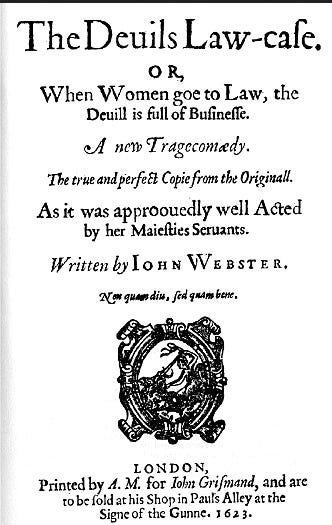#99: Basically an Episode of Jerry Springer
The Devil's Law-Case; or, When Women Go to Law, the Devil Is Full of Business
I am always excited to read a play with a subtitle that is a full sentence, and this one is particularly fascinating. How to interpret this bold statement? Female lawyers send people to hell? When women are arrested for crimes and have to go to court, the devil has to do extra paperwork? If you let a woman come into your courtroom, Satan makes a bunch of money? I suspect that the actual interpretation is going to be a heck of a lot more sexist than I’d like it to be, but as I mentioned in my last post, I know absolutely nothing about this play. Let us remedy this!
The first quarto of this text was printed in 1623, but we don’t have any record of when it was performed or written. Scholars posit that it can’t have been much earlier than the date of printing, though, because the play contains a reference to the Amboyna Massacre (a morbid incident that frankly deserves its own Jacobean tragedy—it involved a bitter business rivalry, Japanese ronin, torture, a head on a stake, and a war of pamphlets). We also know that it, like many of Webster’s plays, was performed by the Queen Anne’s Men. Not only does this quarto open with another Latin-filled epigraph to the Reader (yes, Webster, you’re Very Smart), it’s further prefaced by a very flattering letter to one Sir Thomas Finch, Baronet, in which Webster begs for patronage by pointing out that “the greatest of Caesars have cheerfully entertained less[er] poems than this,” which is a degree of confidence to which I can only aspire. It is also (spoiler alert) a degree of confidence that is in no way warranted given the quality of this play.
Keep reading with a 7-day free trial
Subscribe to All the Words on Page to keep reading this post and get 7 days of free access to the full post archives.



